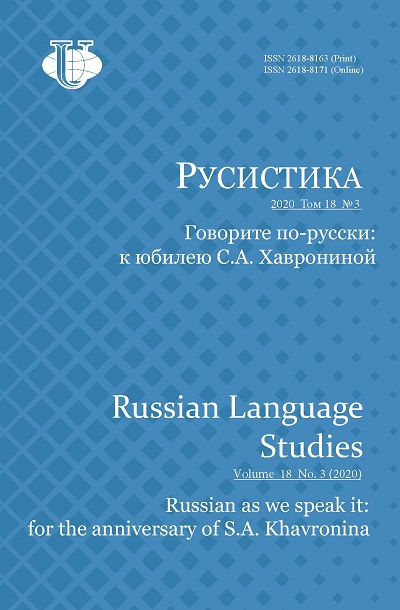Teaching Russian in Turkish universities: modern trends
- Authors: Kulsha D.N.1, Ryabokoneva O.V.2
-
Affiliations:
- Acibadem University
- Private education establishment “My Virtual School”
- Issue: Vol 18, No 3 (2020): RUSSIAN AS WE SPEAK IT: FOR THE ANNIVERSARY OF S.A. KHAVRONINA
- Pages: 359-370
- Section: First Steps in Science (until 20.06.2021)
- URL: https://journals.rudn.ru/russian-language-studies/article/view/24502
- DOI: https://doi.org/10.22363/2618-8163-2020-18-3-359-370
Cite item
Full Text
Abstract
Monitoring the interest in Russian language learning constitutes a significant direction regarding supporting and promoting the Russian language abroad. The relevance of the study is attributed to the scarce amount of contemporary research on the status of Russian in the academic realm of the Republic of Turkey. This study aims to explore the dynamics and trends regarding teaching Russian as a foreign language in undergraduate programmes in Turkey over the last 5 years and identify the primary factors determining the choice of Russian as a major or as an additional skill. Within the scope of this study we have obtained quantitative information regarding Russian undergraduate programme quotas from governmental Internet resources (Council of Higher Education); additionally, evidence was collected via an anonymous questionnaire targeting L1 Turkish L2 Russian learners. The data were analyzed using statistical methods. The obtained results suggest steady and positive dynamics on the state level: the number of quotas for Russian undergraduate programmes in Turkey is gradually increasing; and on the individual level: a genuinely positive attitude towards Russian language and culture is observed among university students. The crucial factors determining the students’ choices are mainly related to instrumental motivation (job opportunities, etc.), whereas integral motivation also plays considerable importance (interest towards Russian language and culture, etc.). The results of the study may prove useful in developing educational materials and setting new directions in intercultural policies.
About the authors
Dzmitry N. Kulsha
Acibadem University
Author for correspondence.
Email: dzmitry.kulsha@acibadem.edu.tr
PhD Candidate (Istanbul Aydin University, Turkey), English and Russian lecturer, Listening and Speaking Course Leader, Assessment Committee Member of Preparatory Programme of School of Foreign Languages at Acibadem University (Istanbul, Turkey).
32 Kayışdağı Ave, Ataşehir District, Istanbul, 34755, Republic of TurkeyOxana V. Ryabokoneva
Private education establishment “My Virtual School”
Email: ryabokoneva@mail.ru
Russian teacher
19 3rd St, Liman District, Antalya, 07070, Republic of TurkeyReferences
- Aktai, S. (2015). History of teaching Russian language in Turkey (case study of Anadolu University). Samara journal of study, 1(10), 128–130. (In Russ.)
- Gardner, R.C., & Lambert, W.E. (1972). Attitudes and Motivation in Second Language Learning. Rowley, MA: Newbury House Publ.
- Kalender, N. (2012). The activities of the department of Russian language and literature of Ankara University within the period of 2009–2011. Russian language abroad, 4, 107–110. (In Russ.)
- Karadzhan, Kh. (2013). Historical basis of Russian language learning in Turkey. Russian language abroad, (1), 103–106. (In Russ.)
- Karadzhan, Kh. (2015). Problemy prepodavaniya inostrannykh yazykov v Turtsii: Prepodavanie russkogo yazyka [The problems of teaching foreign language in Turkey: Russian language teaching]. Linguistics: From theory to practice: The Second International interuniversity conference: Collection of articles (pp. 50–56). Ekaterinburg. (In Russ.)
- Stoyanova, M.L. (2017). A typical Turkish student: Some comments to the question on the peculiarities of teaching RLF in a Turkish university. Pre-University education in Russia and Worldwide: Language, adaptation, society and speciality: Collection of essay: 1st International congress of preparatory school teachers and managers, (2), 267–271. (In Russ.)
- Tekerek, M. (2019). Mustafa Kemal’s communication with the Soviets in national struggle years (1919–1923). Modern scientific thought, (1), 55–67. (In Russ.)
- Uchgul’, S. (2019). Rasprostranenie russkogo yazyka v Turtsii [Spreading the Russian language in Turkey]. Etnodialogi [Ethnodialogues], 1(55), 45–54 (In Russ.)















